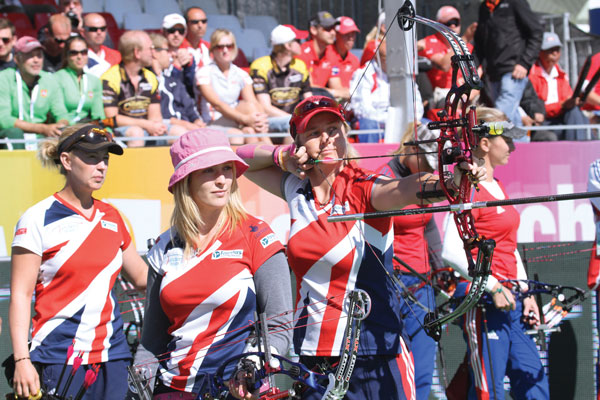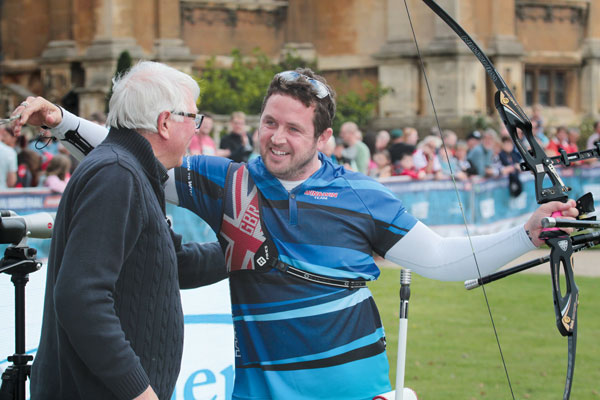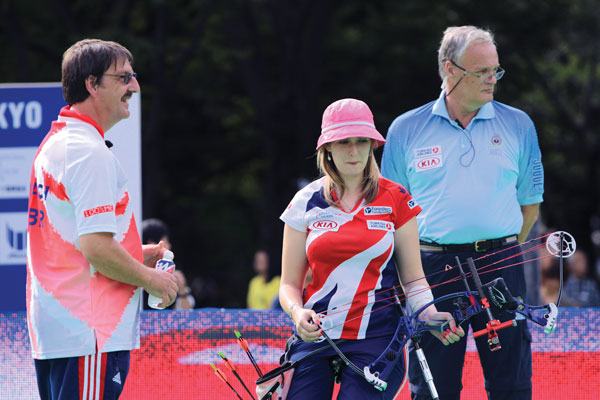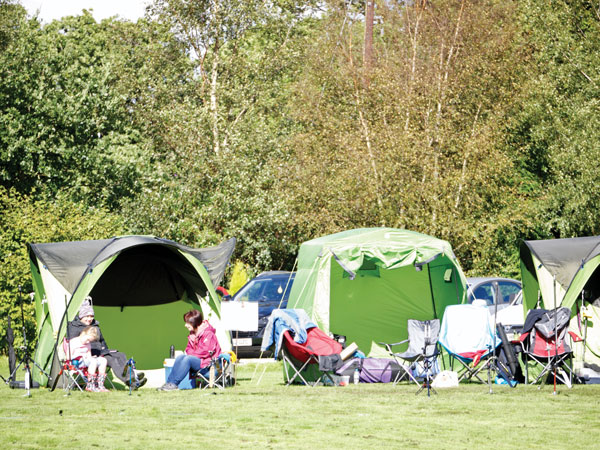Everyone needs a bit of help now and again – and having the right people and relationships in place can be a huge asset to your archery, as Danielle Brown explains

Having a support system can make all the difference when it comes to your performance
Nobody achieves success on their own. In my competitive career so many people helped me achieve; from family, friends and coaches, to fellow competitors who have dragged my bow case across muddy fields and collected my arrows. There were tournament officials who brought me hot drinks when it was pouring down with rain and archers who offered words of advice and support. I may have stood on the top of the podium and collected medals, but behind me was an army of people who made it possible
Even though archery is an individual sport, anybody wanting to take it to the next level must surround themselves with the right people. On the shooting line it’s just you and your bow, trying to execute that perfect shot over and over again. Of course, the preparation and practice you put in beforehand plays a vital role in your continued improvement, but this preparation does not and should not be done alone. Building a strong support team around you will help you get from A to B much more quickly. Your team will help you recover from downturns faster and push you to achieve what you think is impossible. They can provide objective feedback on your progress as well as giving you direction on how to improve further. In short, your support team is your most valuable asset and it’s important to get this right.

A support team will help you get through the bad days, pressure, and improvement process
When deciding what kind of support you need and who the right people to provide it for you are, the first question you need to answer is: what do I want from this sport? Once you answer this then you can start to look at the areas you need help to achieve that goal. If you would like to improve your national ranking or get your MB badge, for example, there are many areas you can focus on, from increasing your arrow count, developing your technique, working on your equipment or increasing your mental strength. Once you have isolated the different areas, the next thing you need to ask is: who can help me with this?
Most archers have a support team in place already. Families and friends play a huge role in most successes, whether they take an active role on the archery field, watch from the side lines, listen about how terrible that practice session just went or find a way for you to get the equipment you need. Every parent, spouse or friend wants their family member to succeed, but trust me, from time to time this dynamic can go wrong…
It’s important to remember that while you are learning to become a better archer, they are learning to be a better support team and they don’t have a manual to tell them what to do. Towards the end of my international career my family were the most supportive, encouraging and understanding team that I could have ever wished for. They put me under no additional pressure and in the most stressful moments of my career they gave me exactly what I needed. However, we made many mistakes before we got to this point. It was communication, or rather the lack of it, that caused most the problems. There were well-meaning comments that got taken out of context, assumptions about my performance and unhelpful observations about my technique. When we eventually realised that certain comments distracted me and others made me feel like I was being put under more pressure, we came up with a plan. We discussed what was helpful and what was not and, in turn, how I could communicate better so fewer issues would bubble to the surface.

They want to see you succeed as much as you do, whatever success means to you
One of the most common comments I have heard parents or club mates say to an archer who isn’t having the best day is, “Your scores are normally a lot higher than that. What went wrong?” It’s usually done with the best of intentions – they are concerned and want to help, but this clumsy way of phrasing it forces the archer to focus on the negative and feel under pressure by those who should be supporting them. I’ve seen this lead to – and experienced it myself – frustration, disenchantment, and, on occasion, even anger.
There is a really quick and easy fix for this. Communication. If a club member is standing behind you on the line, avidly watching every arrow and delivering a running commentary about the score and it’s throwing you off track, then tell them. If doing a post mortem of a below-average score in the car journey home from a tournament is downright depressing, then say something. They’re trying to help, but it’s really difficult for them to give you the support you need if they don’t know any better. So initiate a dialogue. Let the people around you know what you find helpful and what you find distracting. Go back to the question we looked at right at the beginning; let them know what you want out of this sport and see if together you can come up with a plan to help you achieve it.

Your coach will be one of the most important people in your archery life, so make sure you can communicate and work well with each other
Another essential component of your support team is your coach. I believe that every archer looking to improve should get themselves a personal coach. A coach doesn’t just stand behind you on the line and offer technical advice every now and again, but plays a much wider role. They’re there to bounce ideas off, to help you build your confidence and think creatively in order to get the most out of you. And again, communication is the cornerstone to getting this right. Find somebody you trust, somebody who explains the technical elements in a way you understand and tell them what you want to achieve. It sounds pretty obvious, but they can only help you if they know what you want to achieve.
The most important element in the coaching dynamic is the relationship. Therefore, it’s important to take your time and make sure you make the right choice. Out of all the brilliant coaches out there, there will be ones that you will understand and relate to better. It doesn’t mean the others are bad coaches; it just means that they aren’t right for you. You need to pick someone who you can be open and honest with, somebody who thinks they’re capable of helping you get to where you want to go and somebody who is committed to helping you.
Kim Lucas, my personal coach, is fantastic for me. It took two years to persuade him to become my coach and I was very glad he did. He doesn’t have to ask me whether I’m having a good or bad day – he just watches me – then he knows exactly what to say to keep things going or get me to make a quick recovery. He knows how I work best – that I like to fully understand why we are making changes to my technique before we go ahead and do it and I prefer small, simple commands rather than a long explanation.

There are other areas of support as well, such as finding people who can help you improve your strength and fitness, injury support and prevention, and raising your mental game
Another key member of your support team is a training partner. If you can find somebody in your club at a similar level to you, then ask them to be your training partner. This will benefit you both in a number of ways. A bit of friendly competition in practice sessions helps focus your attention and you start to see big improvements in scores quickly as you’re pushing each other along. It increases your commitment to turning up, as you’re not going to put off a training session if you know somebody is at the range waiting for you to turn up. It makes it more fun, which is always a massive plus. And, it helps your form improve. Your coach can’t be stood behind you every single session, but your training partner will soon pick up on bad habits creeping into your technique. If you’re having a disaster of a day they might notice you doing something different to normal, so you can correct it much more quickly than having to wait on your coach.
When it comes to picking the right training partner there are a number of factors. Ideally they should be of a similar standard and have similar goals to you. It’s also essential that you have compatible schedules – it’s never going to work if you can only train on Wednesday through to Friday and your partner is free on a Monday. More importantly, you have to like each other and they should have a good attitude.
There are other areas of support as well, such as finding people who can help you improve your strength and fitness, injury support and prevention, and raising your mental game. The great thing about the archery community is that it’s quite close knit and coaches or club members can point you in the right direction if you feel you would benefit from this.
You are only as strong as the people around you, so choose carefully and communicate well.
This article originally appeared in the issue 116 of Bow International magazine. For more great content like this, subscribe today at our secure online store: www.myfavouritemagazines.co.uk

